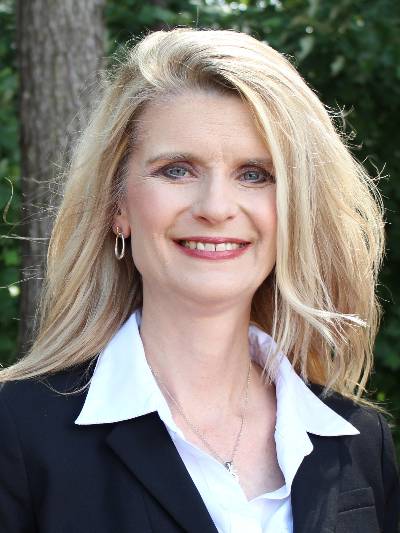Faculty Highlight
Leanne Honeycutt Varner, PharmD
April 29, 2020 This month's faculty highlight features LeAnne Honeycutt Varner, PharmD, assistant
professor in the Department of Pharmacy Practice at PCOM Georgia.
This month's faculty highlight features LeAnne Honeycutt Varner, PharmD, assistant
professor in the Department of Pharmacy Practice at PCOM Georgia.
Why did you choose a career in pharmacy education?
I chose a career in pharmacy education following an academia experience I did at Mercer
University College of Pharmacy during my Post-Graduate Year 1 (PGY-1) residency. During
this residency experience I learned the significant impact the professors had on student's
learning outcomes and preparing future health care professionals to enter any area
of pharmacy they wished to further pursue. I also had the opportunity to meet with
the Dean, Department Chairs and some faculty at Mercer College of Pharmacy to gain
a unique perspective on their roles in the didactic and experiential curriculum and
carrying out the requirements of ACPE.
I practiced as a hospital pharmacist and preceptor for PharmD students 16 years prior
to coming to PCOM. I worked 14 of those 16 years in Emory Healthcare Hospitals and
I currently work as a pharmacist at Emory University Hospital.
My previous and current experiences as a hospital pharmacist have given me insight
into how to better bridge student's learning of classroom knowledge to real world
patient scenarios and clinical application. It is one thing to learn the skills necessary
to be a pharmacist and another thing to be able to apply those clinical skills. My
goals for the classroom teaching is to take the students out of the ebook and presentations
in the classroom and help them understand how to bridge their knowledge to Advanced
Pharmacy Practice Experiences (APPEs), apply knowledge on the NAPLEX and most importantly
as a pharmacist where they are expected to recall their learning of multiple different
disease states and medications to treat those conditions everyday.
What are your research interests?
My research interests include anticoagulation, critical care with focus on respiratory
failure and treating conditions that prevent or prolong ventilator weaning. I also
research experiential learning topics with a focus on preceptor involvement and student
readiness.
What advice do you have for a person considering a career in pharmacy?
My advice to someone considering a career in pharmacy is to shadow a pharmacist to
see the real "day to day" responsibilities a pharmacist does or to obtain a pharmacy
technician job prior to applying to any PharmD program. I would also encourage them
to do research on websites such as American Society of Health-System Pharmacists (ASHP)
to gain knowledge on many areas pharmacists can practice including retail, hospital,
pharmaceutical industry, ambulatory care, long term care, nuclear pharmacy, hospice
and palliative care and other areas. Choosing a career in any field is a lifelong
decision that should be well thought out and ensure the career options align with
the person's personal, family and professional goals.
There are certain key traits a pharmacy student should have which are those I am required
to use each day as a pharmacist. These skills include being professional as well as
paying very close attention to detail to everything I read and recommend for my patients.
I must prioritize patient needs quickly based on the patient's clinical status and
the needs of the providers and nurses I work with. All pharmacists are required to
use these skills no matter where they work.
Students entering the field of pharmacy have more opportunities than were previously
available, which is truly exciting. While it is very exciting to earn a doctorate
or PharmD, rest assured my PharmD came only after many, many long hours of hard work
both in the classroom and on clinical rotations. It was well worth it because I was
committed to becoming a pharmacist and improving patient outcomes. I am very thankful
I choose pharmacy as a career.
If one chooses to pursue pharmacy school, I recommend students work as a pharmacy
intern part time during their PharmD experience to gain work experience and to assist
in learning medications. I also recommend if they want to pursue a hospital clinical
pharmacist specialist position, they should maintain a good GPA in the PharmD program,
seek research opportunities early and as often as possible, obtain leadership roles
in professional organizations, perform well on fourth year APPEs and then apply for
and hopefully pursue a PGY-1 residency and Post Graduate Year 2 (PGY-2) specialty
residency. The final goal after PGY-2 would be to pursue Board Certification in their
area of specialty and one can read about this on the American College of Clinical
Pharmacy (ACCP) website. While this does require two years training post pharmacy
school it provides a lifelong career affording the pharmacists many more opportunities
to provide direct patient care than they would have had without the post graduate
training.
What is your favorite ice cream flavor?
Strawberry Cheesecake.
Learn More
Are you interested in patient care, research, teaching or service? Our program trains
caring, competent pharmacists. Learn more about the Doctor of Pharmacy program at PCOM Georgia.

 This month's faculty highlight features LeAnne Honeycutt Varner, PharmD, assistant
professor in the
This month's faculty highlight features LeAnne Honeycutt Varner, PharmD, assistant
professor in the 